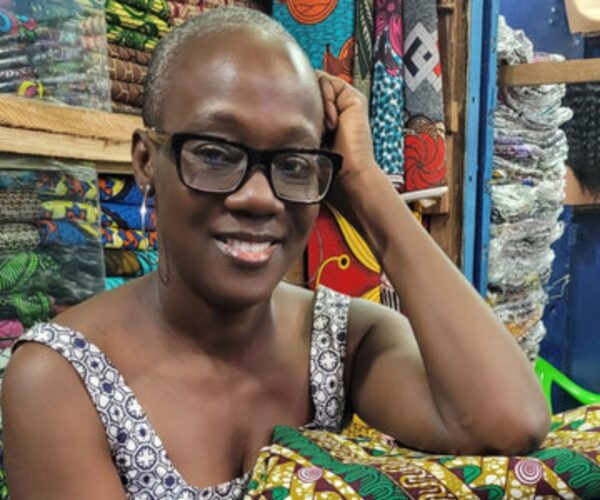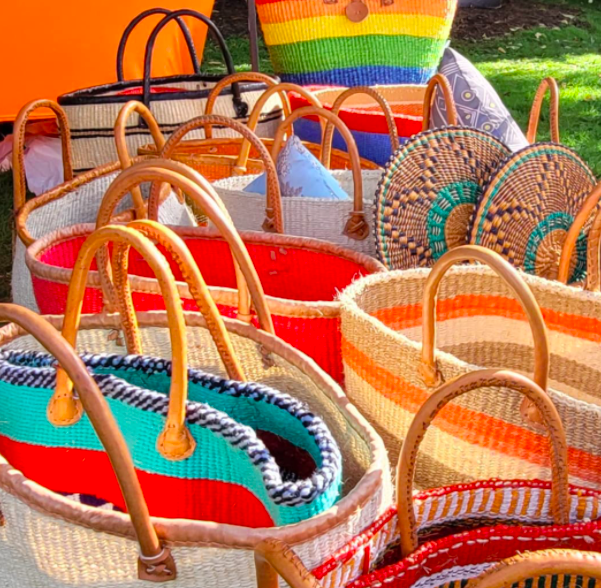Gigi Henries-Jones spent her early life in Liberia surrounded by colorful Ankara fabric, or lappa, as it is called there. The lappa is used in everyday life — from carrying children to balancing items on one’s head to being made into clothes for special occasions and other events. When she moved to New York City, she wanted to find a way to bring the beautiful Liberian prints to the Big Apple.

“I was born and raised in Liberia. During the civil war, my family and I fled Liberia; we came to New York in 1993 as refugees. Later on, my mother returned and retired in Liberia, and my sisters and I all lived in various cities throughout the United States. Liberia has come a long way since the early ’90s, and the country is evolving and changing very quickly,” says Jones.
Liberia, a country in West Africa, was started as a settlement of the American Colonization Society (ACS) in the early 19th century. The goal of the ACS was to give freed Black slaves in the U.S. a place to go back to Africa. It has experienced periods of unrest.
She launched the fashion and accessories line Vai Girl in 2018. African artisans make the products with Liberian fabric and fabrics from around the continent.
After hunting for a perfect handbag, she started her company and realized she could design her own with local artisans in Monrovia. She did just that and, in the process, created a company, which is run with the help of her family — her sisters, nieces, and mother, whose names are used for some of Vai Girl products.
“I’ve worked in high-end retail for years, and it started with me wanting a bag to take to work when I was on a trip back home, I had one made, and people started asking me for more. I’ve always been, as we Liberians say, a ‘market woman’ selling things and recommending products from back home. So it was a natural fit to begin to curate an e-commerce store with various products from Liberia and other African countries. My eye for products and detail is unmatched, and I wanted others to experience the beauty and uniqueness of products made in Africa,” she shares.
“The goal was to share the joy of my country with others and to deliver superior experience and products. I don’t believe that I’m giving back to Liberian artisans as much as making way for their product to find a broader audience. I can work with them to improve their products and ensure high quality,” she explains to Finurah.
She adds, “My audience and customers continually respond to their products, which is the goal. I’m happy to be able to provide more businesses for them and allow their products to make it to a global audience.”
Dealing directly with local Liberian artisans also gives her the chance to offer custom items to customers.
One of the things Liberia is known for is its vibrant, unique prints, which Jones turns into handmade bags and accessories. Jones likes to combine sustainable materials and timeless design. Handbags are priced from $20-$95, depending on the material used. Basket-handwoven bags are on the upper price tier. Handmade sandals run $50-$65.
She has now expanded from custom handbags to also selling jewelry, apparel, and skin care.
And it’s a special kind of skin care — again inspired by Liberia.
“A year after I started Vai Girl, at local markets around NYC, people would always comment on my skin and how smooth it is. They asked me for my secrets, and while it’s mostly genetics, it’s also black soap, pure shea butter, and unrefined coconut oil because my skin is so sensitive,” notes Jones. “I’ve long used the black soap and coconut oil made on my mother’s farm in Liberia, and I whip the shea butter from Ghana with the coconut oil from Liberia. They are natural products and products I’ve used almost my whole life without thinking. So I was happy to share them with the world.”
Besides Liberian beauty secrets, she is also sharing the Liberian aesthetic. “The colors, the geometric balance of the designs,” enthuses Jones about the Liberian aesthetic.
“We are committed to making sustainable designs that support the artisan community within Africa,” according to the company’s website. “Our handbags use leather from sheep that the locals consume as a part of their diet. The real snakeskin and crocodile skin used in our bags are not caught for just their skin, their meat is consumed, and the skin is a by-product of that process. The dyes used for the leathers are vegetable dyes that do not harm the environment.”
Jones explains, “Sustainability is just a way of life in many African countries. In Liberia, we don’t waste anything. So it’s only natural we make things out of everything available to us. The same goes for other countries, like Ghana, using straw and natural dyes to make colors. It is a tradition that goes back centuries, so I’m just happy to be able to see it continue and share those products with the world.”
Vai Girl is named after her tribal roots in Liberia. “Vai Girl is an homage to my home Liberia; Vai is the name of my tribe. Girl evokes a sense of playfulness and lightness that I feel when thinking about my home and my people. The Vai people are resilient and joyful,” she explains.
Vai are people inhabiting northwestern Liberia.

Jones splits her time between NYC and Monrovia as well as other parts of Africa.
“Before COVID, I traveled there about two or three times a year. In 2019, I started traveling to Rwanda as well to source products, and as my store has grown, I’ve been able to source products from Liberia, Ghana, Rwanda, South Africa, and Kenya,” she says. “As COVID restrictions have eased and after getting the vaccine, I’ve gone to Rwanda, Liberia, and I’ll soon be going to Kenya. Working with the artisans has been super fulfilling and a wonderful experience. I love to see client photos of my products in their home.”
The pandemic has made customer communication difficult.
“COVID has been on the biggest challenges, being unable to sell in person, as I’m a gifted saleswoman and connecting with people face to face energizes,” she says. “I love to allow people to touch and feel the product. During the pandemic, I improved my online store and my photography abilities and worked to improve my marketing. It’s an ongoing process to improve myself and the store; it’s the plight of an entrepreneur to grow and change and evolve.’
The last year also made it challenging to receive goods.
“Not being able to travel and see and touch the products was a huge struggle. I had to pay to have many things shipped, which was very expensive. But not being able to sell in person was also a large challenge. I had amassed a following at many street markets where people like to see and touch the items, and they can’t do so online. I have such a variety of products decorated with vibrant colors; this doesn’t always translate well online to make for a seamless e-commerce experience. So I struggled to market my products and get new customers when pivoting to an online format,” she says.
Now she’s looking forward to a post-pandemic business world. Says Jones, “My goals are to continue to grow my portfolio of products, gain new customers, and gain more wholesale accounts with boutiques around the country.”
She also educates her customers about African products. “Of course, it’s a part of the story of each of my products. People ask about Liberia and other countries, and I share how each product is made.”
She likes to convey the story behind each of her products.
“My ability to curate high-quality, unique products, each with a story to tell at competitive prices. My artisans always send me photos of new things they have created, and I do custom orders for customers whenever they ask,” says Jones. “Our latest product, the Bogolan, is handmade Malian cotton dyed with fermented mud, and on the other side is Ankara fabric. It’s a great throw or scarf that is reversible. It’s important that I educate people on the traditional methods of creating these products while still choosing patterns and styles that are modern and fit within most homes or styles. I’m able to translate home decor and fashion trends that are taking over the market and matching that with traditional African product making.”




